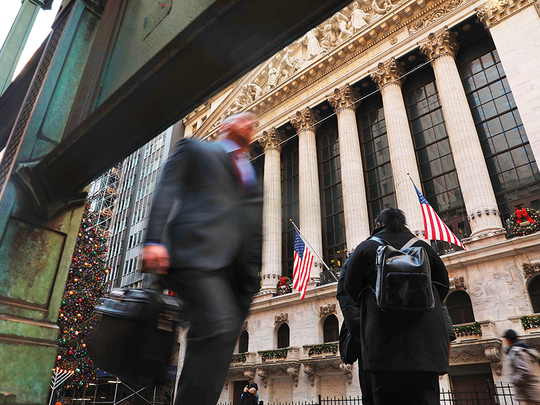
President Donald Trump invoked “America first” by pulling the US out of the Paris climate accord, promising to revive the coal industry and repeatedly tweeting himself as the author of the 105-month-old bull market. The nation’s top money manager of 2017 took the opposite path to becoming No. 1 and says it’s better to be lucky than smart.
He embraced clean energy and international technology companies, especially California’s Tesla and China’s Alibaba, and rewarded his $6.5 billion mutual fund customers with returns that dwarf every major benchmark of global equity performance.
Meet Charlie Chai, the 40-year-old Dartmouth graduate who joined Boston-based Fidelity Investments out of college in 1997. He runs the Fidelity Select Technology Portfolio from an office in Hong Kong, where he moved in 2011 because he wanted to be close to the market where the supply and demand for technology is growing faster than anywhere else.
His fund is among the 208 biggest US equity mutual funds, defined as those investing at least 70 per cent of a minimum $5 billion in domestic stocks, either through active or passive indexed assets, over three years or more. Chai led that group this year, returning more than 50 per cent since January 1, 2017, and an 83 per cent return since the beginning of 2015, according to data compiled by Bloomberg.
Chai is beating the world with an annual return of 52 per cent. That’s almost twice the 28 per cent rise in the Dow Jones Industrial Average and the 22 per cent increase in the S&P 500. Among the 855 mutual funds worldwide with total assets greater than $5 billion, Fidelity’s Chai is ahead of all of them, including his closest US-based competitor, the $5.4 billion T. Rowe Price Science & Technology Fund, which has returned 41 per cent so far this year, according to data compiled by Bloomberg.
“A fair amount of that has to go to luck,” Chai said in a telephone interview, explaining that his standard investing strategy simply produced unusually strong results in 2017. “It’s just this year everything kind of worked, and not every year can everything work at the same time.”
While information-technology companies returned 41 per cent this year as the best-performing sector among 10 US industry groups, Chai concentrated on 10 firms. Five are from the US (Cognizant Technology Solutions Corp., Nvidia Corp., PayPal Holdings Inc., PTC Inc. and Tesla Inc.); two are Chinese (Alibaba Group Holding and ASM Pacific Technology); and one each is from Taiwan (Nanya Technology Corp.), Japan (Minebea Mitsumi Inc.) and Germany (AMS AG).
Seven are in technology and three are in consumer industries, Bloomberg data show.
Chai’s portfolio over-represented consumer discretionary stocks by 9 percentage points and underrepresented information technology shares by 15 percentage points compared to the benchmark MSCI US IMI Information Technology Index. Software and services increased to 50 per cent of the portfolio from 44 per cent in 2016, with PayPal rising to 1.4 million shares from 8,100 and Facebook increasing to 2.3 million from 1.6 million, according to data compiled by Bloomberg.
Hardware stocks declined to 16 per cent from 22 per cent as Chai sold all 1 million of his Cisco shares.
The biggest driver in Fidelity Select Technology proved to be autos. Tesla shares became Chai’s biggest movers and contributed one-tenth of his fund’s superior performance as he tripled his Tesla holding from the end of 2016, when the stock fetched $213, or 35 per cent less than its current price. Chai held 868,000 Tesla shares this fall after purchasing 81 per cent of his new Tesla stock in the first quarter, when the price soared by 30 per cent, according to Bloomberg portfolio and risk analytics data.
“Tesla is one of my biggest bets in the funds throughout this year,” Chai said, comparing the company to “Apple from 10 to 12 years ago”.
He elaborated: “I think the auto market is clearly bigger than the handset market and the smartphone market for sure. And [Tesla] will over time generate a lot more gross profit dollars than the entire handset market. I think the real question is, “Do you believe in electric vehicles as a better substitute than internal-combustion-engine cars?”
“From the math I’ve seen and the work I’ve done, within the next three to four years, we will come to a point where electric vehicles from a total cost of ownership and from an initial ownership perspective will be equal or cheaper than the internal combustion engine.”
Chai predicted that Tesla’s earnings per share could increase by $20 or more by 2020, even after suffering the $9.10 loss estimated for 2017 by analysts surveyed by Bloomberg. That’s partly because Tesla, in Chai’s estimation, leads its competitors in technology, data-collection techniques and the quality of its data scientists.
Chai also increased his Apple holdings by 28 per cent, to more than 3.8 million shares in the 10 months ended October 31, a decision that was largely responsible for Fidelity Select outperforming its T. Rowe Price rival, which owns no Apple shares. Apple climbed 51 per cent in 2017, buoyed by “international sales something like 60 per cent to 70 per cent of its revenue in any given year,” Chai said, noting that “its biggest market outside the US is China.”
The contrast to Trump’s America-first worldview is impossible to miss. “Tech, by its nature, is very, very global,” Chai said.












